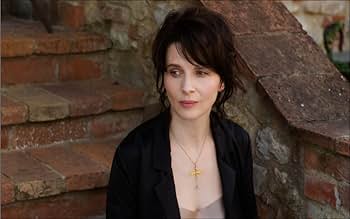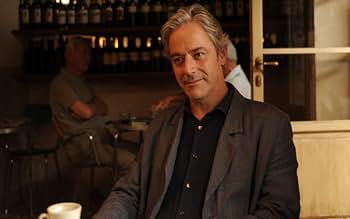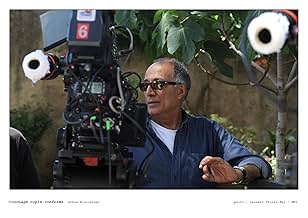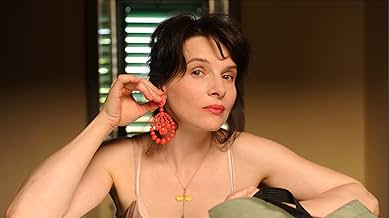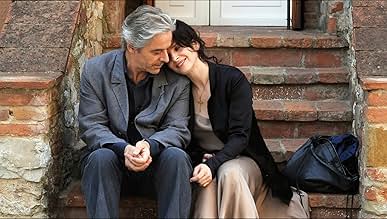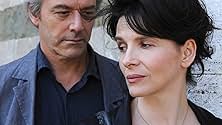Para promover seu último livro, um escritor britânico conhece uma francesa que o leva até a aldeia de Lucignano. Onde uma pergunta casual revela algo mais profundo.Para promover seu último livro, um escritor britânico conhece uma francesa que o leva até a aldeia de Lucignano. Onde uma pergunta casual revela algo mais profundo.Para promover seu último livro, um escritor britânico conhece uma francesa que o leva até a aldeia de Lucignano. Onde uma pergunta casual revela algo mais profundo.
- Direção
- Roteiristas
- Artistas
- Prêmios
- 11 vitórias e 29 indicações no total
- Le marié
- (as Filippo Troiano)
- La mariée
- (as Manuela Balsinelli)
- Direção
- Roteiristas
- Elenco e equipe completos
- Produção, bilheteria e muito mais no IMDbPro
Avaliações em destaque
The Review: Juliette Binoche has had a career spanning nearly thirty years, and for much of that has jumped between roles in her natural language and English. You might think that, with the supposed paucity of good female roles in movies, that there's not much left for Binoche to cover that she hasn't before, but here she gets to explore some new territory to Cannes best actress award-winning effect. In the process, she gets to cover a range of languages, not only English and French but Italian, but in this case there is a specific purpose to the variances of the language.
The set-up is simple: William Shimell plays James Miller, an British author on a tour of Tuscany where his work on originality in art has been better received than in his homeland. Binoche is the woman who comes to hear his talk, and the two are then drawn together in a discussion of his work. Once the two meet again, the course of the movie charts their discussions over the course of an afternoon, taking in the Italian countryside and engaging with a number of characters along the way who cause them to reflect on their differing viewpoints on Miller's work.
There's a turning point as we approach the halfway mark where one of those characters seemingly mistakes the pair for a married couple. What starts as a role play, set off by the misunderstanding, takes on more and more aspects, and eventually both the pair and the audience are lost in the drama. The whole movie reveals itself to be an intricate construct on this concept, almost every aspect of the theme, the performances or the setting playing with the motif of originality versus imitation. Reflections in car windows sometimes obscure the actors themselves, POV shots ask us to engage directly in the drama almost as a participant and this even extends to the leading pair themselves – Shimell is a renowned baritone, not an actor, and there is a slight but noticeable difference between his performance and that of Binoche, which almost feels like a copy of acting rather than being fully immersed in the role.
While this reinforces the concept, it does prevent the audience from fully engaging, being kept slightly at arm's length by the constant artifice. That's not to say that there's not a lot to enjoy here, with the confusions and the tensions making this verge on a romantic comedy at times. Despite the differences in acting ability, Shimell and Binoche make an engaging couple at times and as time wears on, you find yourself more keen to believe that the beginning was the illusion and that their relationship is real and not the copy. Much of the credit for this must be placed at Binoche's door, using the language differences to vary mood effectively, but also adding colour and emotion in all of the languages she uses. The only one here who's on familiar ground is director Kiarostami, who's explored these themes before but never to such mainstream effect – worth checking out if you'd like to engage your mind and your heart.
Why see it at the cinema: There is a very literal aspect of the visuals which runs throughout the course of the movie, which the cinema screen will allow you to fully appreciate.
The score: 7/10
It has originality - it will not be like other films seen recently in mainstream European cinema, there is little or no plot, or action, rather we dealing with conversation, and the state of the heart and the mind in a fiercely non-Hollywood fashion. This is a film about thinking about emotions, and is almost non-linear in its conversations and if that concept doesn't appeal then it may well not be viewable.
It is, however, despite itself, pretty mesmerizing - what will they say next? what other aspect of why relationships fail and succeed will be tossed into the salad? who are they? why the games? etc;
The conversations are both alienating and intimate, and have a "play-acting" aspect that allows the psychosexual aspect of how we adults explore potentiality to be examined in a way that is normally reduced to sexual tension and flirting on film. This is a film that demands attention - this is not dumb film-making. I recognize the conversations and the feeling well, but in a sense the connection is too contrived to be really successful - but it certainly touches that part of intimacy that is normally, at best, ethereal.
The setting of Chianti and a beautiful hot summer day, with cicadas and a wonderful small town to explore, lightens this - but it remains a film for philosopher romantics. It is, as others here have noted in better ways than me, film as film - here there are images and shots that work to compliment the alienation and solipsistic nature of the two leads.
A film about questions that offers few answers, it is certainly intriguing and if you are into human exploration and condition worth the effort to watch.
Or was it mistake? It becomes clear that these people have some connection with each other, whether they are divorced, former lovers or something entirely separate, and the conversation becomes much more biting and intriguing. Writer/director Abbas Kiarostami keeps us gripped into this conversation, as these two ponder on the copies of the world, along with the tribulations of a marriage, what makes a good husband, what makes a good father and so much more. She attacks him for being such an absent father (is her son really his?) and he explains that sometimes one partner in the marriage just has to be gone and that's the way the world is. The film poses so many interesting questions on the world and leaves it up to the viewer to decide the answers for themselves. Each character has their own strong opinion, but Kiarostami never takes a side and tells the viewer the resolution. It's a powerful picture that keeps you thinking long after it's over.
Part of the power of course relies on the strength of the performances, and both of these actors knock it out of the park. William Shimell was the perfect choice for the distant, simple author. Juliette Binoche, however, steals the show, with an authentic and brave performance that ranks up with some of her absolute best. She is arguably the finest actress in cinema today, and has a grasp on portraying vulnerability that very few actors can come close to achieving. Within her you really see the pain of a woman scorned and the exhausting life led by a single mother constantly having to think of someone other than herself. She is everything here; emotional, strong, falling apart and beautiful. It's a perfect performance in a magnificent film. I feel like this is a picture that will only get better on repeated viewings, and it's still quite strong on the first one.
It's really enjoyable with unexpected progress of the story (unexpected especially if you're brainwashed by certain type of movies about male-female relationships). It has room for interpretation, everything is not explained and it lets the viewer bind the remaining threads. It's also funny and I found it quite intense. It held my attention and actually felt about ten minutes shorter than it really is. I have to admit that I'm a big fan of intelligent movies about male-female relationships. Long well written and acted scenes with just a man and a woman talking don't turn me off.
The formal control of the shots by the director and the cinematographer are masterful. There are those long shots that Kiarostami has used before, but used masterfully in the context of the story, and not in any "look at me, Mom, I'm sculpting in time" -art house tedium.
I talked with couple other persons who saw the movie, and they said that they didn't like it. But let me tell you that it's really good.
Você sabia?
- CuriosidadesDuring a visit in Tehran by Juliette Binoche, Abbas Kiarostami told Binoche the synopsis of Certified Copy as a casual anecdote, which she said that she fully believed until he confessed to having made it up. According to Kiarostami, studying the reactions of Binoche as she listened to the story was a vital part of the film's further development.
- Citações
James Miller: It seems to me that the human race is the only species who have forgotten the whole purpose of life, the whole meaning of existence is to have fun, to have pleasure. And here is someone who's found their own way to do it. We shouldn't judge them for it. If they're happy and enjoying life, we should congratulate them, not criticize them.
- ConexõesFeatured in Breakfast: Episode dated 31 August 2010 (2010)
- Trilhas sonorasO surdato 'nnamurrato
Written by Aniello Califano (as A. Califano) and the music by Enrico Cannio (as E. Cannio)
Principais escolhas
- How long is Certified Copy?Fornecido pela Alexa
Detalhes
Bilheteria
- Orçamento
- € 7.000.000 (estimativa)
- Faturamento bruto nos EUA e Canadá
- US$ 1.373.975
- Fim de semana de estreia nos EUA e Canadá
- US$ 77.937
- 13 de mar. de 2011
- Faturamento bruto mundial
- US$ 7.736.632
- Tempo de duração1 hora 46 minutos
- Cor
- Mixagem de som
- Proporção
- 1.85 : 1
Contribua para esta página





